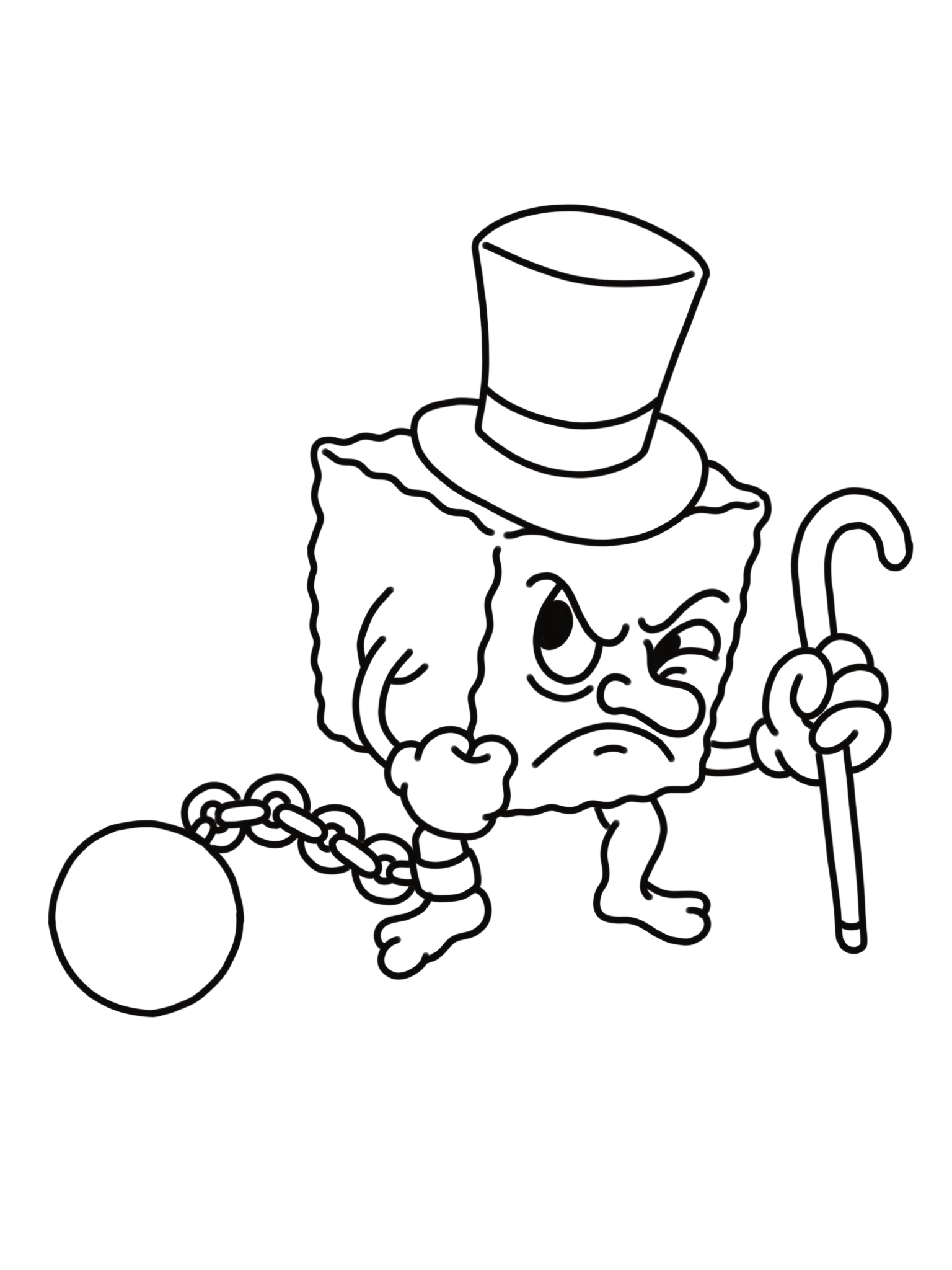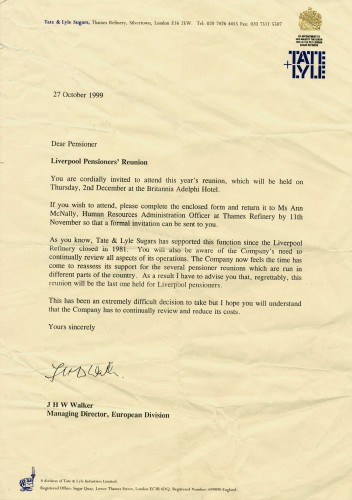Love Lane Lives
The history of sugar in Liverpool and the effects of the closure of the Tate & Lyle sugar refinery, Love Lane
The 1999 story of a lump of sugar
Written by Ron Noon at 17:08 on Monday, December 02nd 2019

FACT OF THE DAY
It was 20 years ago today on a bitterly cold Thursday afternoon that the former Tate & Lyle workers from Love Lane had their last Christmas bash, beneath vivid streamers strung across the banqueting hall of the Adelphi Hotel. The boys and girls from the white stuff had refined and packed the bags which had sweetened the nations teas and breakfasts but sadly Tates’ “need to continually review and reduce costs” on the threshold of a new millennium, transformed Xmas into a last supper on Lime Street.
Sugar’s not just any old banal everyday commodity. It’s a perfectly legal, achingly addictive drug that like Elvis and sex is here there and everywhere and it’s a killer. Readers know I’m not sponsored by Tate & Lyle and that the only thing that had really mattered to me before I started working through the documents on the ten year struggle to keep Liverpool Love Lane refinery open was that it was sweet. I soon discovered that was the last thing to be said about it’s infamous history and August Cochin, summed this up brilliantly. “The story of a lump of sugar is a whole lesson in political economy, in politics and also in morality.” My summary section may appear as a crude paraphrase of that sweet gem but my objective is to underscore Cochin’s scholarship and it’s relevance to the political and public relations consequences of “Mr Cube”. Why was a Labour majority of 186 in 1945 reduced to 6 in February 1950? What did Mr Cube have to do with that?
As I mentioned in the last blog Mr Cube reached 70 years of age in July of this year. “He was no ordinary sugar lump and arguably the most famous of all the trillions and trillions of sucrose cubes ever produced. Animated by squiggle for arms and legs and the sword and shield of Free Enterprise Capitalism he took on and defeated” Clem Atlee’s plans for nationalising sugar refining. (Worse than a little bugger for this historic Labour Government.)
Sugar was both fact and metaphor for the sweet things in life that were conspicuously absent when children would suck carrots for sweetness. The post war period witnessed years of generalised austerity. That said compared with today, the austerity in Britain followed on a devastatingly damaging world war unlike the deliberate Con-Dem and Conservative political choices of this millennium! An attempt to de-ration sugar was made but it was a failure. This is what I wrote in an essay written in 2007:
A cameo of this early predilection towards the good life as the sweet life was the experiment in de-rationing sweets. When carrots were sucked by children as sweets, Pathe News recorded the events in April 1949 that were designed to “put the fun back into being young” with its film footage of tiny tots queuing in anticipation of sweet shops opening up with their de-rationed goodies.
“Tots mouths have watered a whole lifetime for this great day. For years they’ve been cheated by the hard facts of world economy, from the unrestricted orgies, once accepted as the birthright of every child. But now hundreds and thousands are back by the billions, sherbert and gobstoppers and aniseed balls, lollipops and chocolate bars. And now for the Tummy Ache of a lifetime.”
The anticipated epidemic of tots tummy aches was prevented by killjoy Food Minister John Strachey who did not build up sufficient stocks to meet the pent up demand and failed “to take into account considerations such as the present high cost and shortage of tobacco, the cut in our meat ration and our dull diet”. 33 The disappointing result was that unlike France, Holland, Belgium, Luxembourg, Poland, Switzerland and Eire, Labour Britain botched the experiment in assuaging dietary severity with sweets.
Fast forward to 1999. I wrote this not long after the Last Supper on Lime Street:
“Tate & Lyle’s metamorphosis from a family firm into the financial community of transnationals has inexorably witnessed a withering away of local roots and loyalties. Global perspectives and significant organisational and personnel shifts, have seriously compromised the Sugar Giant’s paternalistic image, at least in Liverpool. Up until this month though, the end of sugar cane time in April 1981, and the subsequent blighting of that inner city community, was viewed as the most dramatic consequence. But now it seems Henry Tate the wealthy entrepreneur and philanthropist, has unintentionally bequeathed to the world a soulless global corporation that scrapped Christmas in his former sugar capital. The company decision to continue the tradition of delivering a Christmas hamper to its non-executive employees was the last vestigial relic of what had once been a local family firm. But as the barman in the Beehive called out the very last orders from the partying but increasingly dejected looking pensioners from Tate’s, that token gesture looked about as substantial as the froth on my dear mate Albert’s pint of bitter.”


Cartoon drawn by Philip Bell
This whole episode totally transformed the priorities and approaches to my then five year old sugar project, galvanising me to organise a petition to “bring back the Christmas bash for the boys and girls from the whitestuff”, demanding, as it invariably would, much more detailed research into the Tate & Lyle champion of Free Enterprise and his Public Relations agent Aims of Industry. The initial addiction to a sugar lump with a prefix would eventually turn out to be very rewarding for our public history project but a lot of history had to be made first.
More to follow tomorrow: